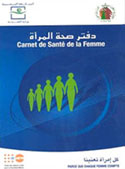News
Little Blue Book Helps to Improve Maternal Health in Morocco
- 23 August 2007
News
RABAT, Morocco — Latifa, more than seven months pregnant, awaits a prenatal consultation with her gynaecologist in a spacious, breezy meeting room in the National Hospital for Maternal Health Orangers in Morocco’s coastal capital. As the 22-year-old shifts in her chair, she chats with a neighbour, who has also come for a pre-natal check up. The atmosphere is relaxed, with none of the hurried intensity of many maternal hospitals. Nearby in another waiting room, women watch a video on natural births and baby care.
Asked how many times she has come here for pre-natal exams, Latifa reaches into her bag and pulls out a small, official-looking blue booklet. “This is my fourth and final visit before giving birth,” she beams.

The blue book provides medical documentation
The booklet documents all pre- and post-natal visits and includes information on previous pregnancies and notations about complications or medications, among other things. In addition to documenting her maternal health history, the booklet contains general information on pregnancy and motherhood.
The booklet, provided by the Ministry of Health, was developed with assistance from UNFPA, the United Nations Population Fund. Most women of reproductive age using the public health system now have one of these little blue books.
Latifa, who is pregnant with her first child, is satisfied with the care she is receiving at the national hospital, which she says has better services and more sensitive staff than private clinics. “Private clinics in this country want to give you a C-section whether you need one or not. Here the services are free and the quality is very good.”

In a nearby office another pregnant young woman, named Keltoun, is finishing her third pre-natal consultation. Dr. N. Boulehanni, her doctor, has worked in this facility for five years. Taking off his glasses, and leaning back in his office chair, he explains that the main services offered by the hospital include prenatal consultations, gynaecological exams and emergency obstetric care.
Slow but steady progress in reducing maternal deaths
This facility is the main centre for obstetric care in the entire country. Every day, on average, personnel deliver 23 babies. Although some require Caesarean sections or other interventions, most are normal births. During the past four years, health workers recorded only two maternal deaths. Both were rural women suffering from severe haemorrhage who arrived too late to be saved.

Two deaths in four years is a vast improvement compared to the past. At 220 deaths per 100,000 live births (2004 figure), maternal mortality in Morocco is still considered high, but the rate was 50 per cent higher 15 years ago. Other indicators are showing signs of progress as well. Since 1990, skilled attendance at birth has increased from 40 per cent to 60 per cent, and perinatal care has risen from 50 to 80 per cent.
UNFPA has played a critical role in improving maternal health in Morocco. “The Fund has improved our capacity to handle obstetric emergencies,” says Dr. Boulehanni. “This has helped us cut back on maternal deaths and prevented a lot of pregnancy-related ill health.”
Dr. Radouane Belouali, the UNFPA programme officer in charge of maternal health, attributes the high death rate country-wide to the number of maternal deaths in rural areas, where services are poor, or non-existent.
"We still have very uneven access to quality reproductive health services in many rural areas,” says Dr. Belouali. “But UNFPA, working with the Ministry of Health, is putting a lot of resources into training rural midwives so they can recognize complications and refer women to regional hospitals or clinics for appropriate care.”
But here in Rabat, Latifa, who has finished her last examination before giving birth, feels confident that all will go well. “We know it’s a baby girl,” she says proudly. “My husband and I are both delighted that I am having a normal pregnancy and that I will deliver in this hospital with such wonderful facilities.”
— Don Hinrichsen
UNFPA’s Work to Improve Maternal Health in Morocco
The current UNFPA country programme in Morocco focuses on providing services to nine of the country’s poorest provinces. These provinces are home to 4.2 million people, with two thirds of them living in poor, underserved rural communities.
The role of UNFPA is twofold, explains Dr. Belouali. First it aims to improve the quality of emergency obstetric care, and second, to train staff – doctors, nurses and midwives – to deliver quality services in underserved areas and refer complicated pregnancies to a higher level of care.
Morocco still has a difficult road ahead in improving maternal health services in remote, rural provinces, but the Government has launched a major national initiative for human development, supported by a consortium of major donors. At the core of this ambitious plan is more investment in human health, including reproductive health, education (especially for girls) and micro-finance schemes designed to generate jobs.